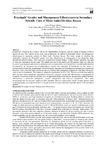Principals’ Gender and Management Effectiveness in Secondary Schools: Case of Mtito Andei Division, Kenya

View/
Date
2015Author
Matheri, Eunice Wangui
Cheloti, Selpher K.
Mulwa, David M.
Metadata
Show full item recordAbstract
Educational leadership has a critical role in the transformation of society, and for change to happen, effective leaders are key. The purpose of the study was to determine the effects of principals’ gender on management effectiveness in secondary schools in Mtito-Andei Division, Kenya. The study sought to establish the relationship between the Principals’ gender and their effectiveness in management of the discipline, staff, students and school finance. The study used ex-post facto research design. Simple random sampling was used to select the respondents for the study. The sample size was 28 principals and 140 teachers. Data was collected by use of questionnaires and interview schedules and was analyzed by use of descriptive and inferential statistics. Conceptually, the chi-square test of independence statistic was computed. In hypotheses the four scores in management of discipline, management of staff personnel, management of students and management of financial resources were converted from continuous data to discreet data (categories) respectively and then Chi-square used to test the hypotheses. The researcher adopted a significance level of 0.05. The results of the data analysis show that there was a significant relationship between the principals’ gender and effectiveness in management of discipline. It was also found out that there was no significant relationship between the principles gender and their effectiveness in personnel management, student management and financial management.. The study recommends that the teachers’ employer (The Teachers’ Service Commission) should consider gender while promoting deputy principals to become principals in order to ensure that there is gender equity in the secondary schools.
Collections
- School of Education [203]
